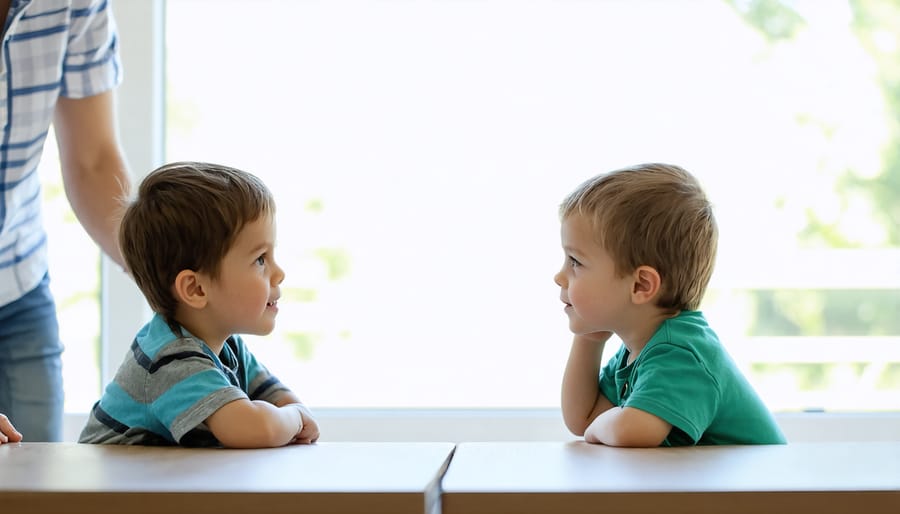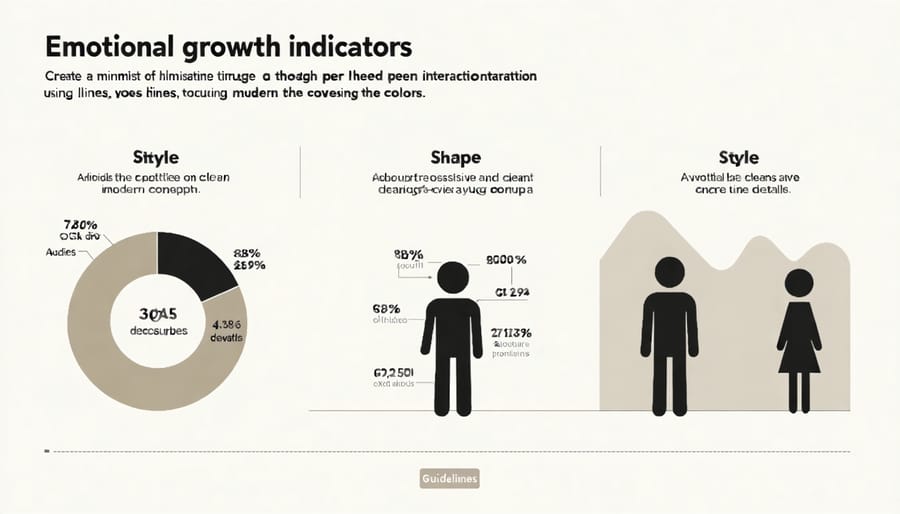Building resilience in children starts with small, everyday moments that create lasting emotional strength. Like a muscle that grows stronger with exercise, resilience develops through both challenges and support. When children face setbacks – from playground disagreements to academic struggles – they have an opportunity to develop crucial coping skills that will serve them throughout life.
Recent research in child development shows that resilience isn’t just about “toughing it out.” Instead, it’s a complex interplay of supportive relationships, adaptive skills, and positive experiences. Children who develop strong resilience are better equipped to handle stress, bounce back from disappointments, and approach new challenges with confidence.
As parents and caregivers, we play a vital role in this journey. By creating a nurturing environment where it’s safe to make mistakes and try again, we help children build the emotional foundation they need to thrive. Whether it’s encouraging them to persist through difficult homework, processing feelings after a friendship conflict, or celebrating small victories, each interaction contributes to their resilience toolkit.
This approach to building resilience isn’t about eliminating challenges – it’s about equipping our children with the skills, support, and confidence they need to face life’s inevitable ups and downs while maintaining their emotional well-being.
The Power of Positive Peer Connections

Building Confidence Through Friendship
Friendships play a vital role in building healthy self-esteem and developing emotional resilience in children. When young people form supportive peer relationships, they create a safe space to express themselves, learn social skills, and develop a stronger sense of identity.
Dr. Sarah Chen, a child psychologist, explains, “Through friendship, children learn they’re valued and appreciated for who they are. This validation from peers creates a foundation of emotional security that helps them bounce back from challenges.”
Consider eight-year-old Emma, who struggled with anxiety about public speaking. Her close friend Maya’s unwavering support and encouragement helped Emma gradually overcome her fears. By practicing presentations together and receiving positive feedback from a trusted peer, Emma developed both confidence and resilience.
Healthy friendships provide children with:
– A support system during difficult times
– Opportunities to practice empathy and emotional regulation
– Safe spaces to try new things and take reasonable risks
– Regular positive reinforcement and acceptance
– Real-world experience in problem-solving and conflict resolution
Parents can support friendship development by creating opportunities for social interaction, helping children navigate conflicts constructively, and modeling healthy relationships in their own lives. Remember that quality matters more than quantity – even one or two close friendships can significantly impact a child’s emotional well-being and resilience.
Learning Social Skills Together
Peer interactions play a vital role in developing social skills and building resilience during childhood and adolescence. Through daily interactions with friends and classmates, children learn essential coping mechanisms that help them navigate life’s challenges.
When children engage with peers, they naturally encounter various social situations that require problem-solving, emotional regulation, and conflict resolution. These experiences serve as valuable learning opportunities where children can practice managing disappointment, sharing resources, and working through disagreements constructively.
As Sarah Martinez, a child psychologist with 15 years of experience, explains, “Peer relationships are like a laboratory for emotional growth. Each interaction teaches children something new about themselves and others, helping them build confidence and resilience.”
Parents can support positive peer interactions by:
– Arranging playdates and group activities
– Encouraging participation in team sports or group projects
– Teaching children how to be good listeners and friends
– Helping them process social challenges when they arise
– Modeling healthy relationship skills
Remember that every child develops at their own pace, and some may need more support than others in social situations. The key is to provide gentle guidance while allowing children to learn from their experiences. These social connections not only help children develop stronger coping skills but also create support networks they can rely on during difficult times.
When Peer Pressure Becomes a Growth Tool
Navigating Social Challenges
Social interactions during childhood and adolescence can be challenging, but these experiences play a crucial role in building resilience. When children face situations like exclusion from peer groups, disagreements with friends, or navigating complex social dynamics, they develop important emotional and social skills that serve them throughout life.
Dr. Sarah Chen, a child psychologist, explains, “Each social challenge a child faces is like an emotional workout. Just as muscles grow stronger through exercise, emotional resilience develops through managing social difficulties.”
Consider Emma, a 12-year-old who initially struggled when her best friend moved away. Through supportive guidance from her parents and teachers, she learned to make new connections and adapt to change. This experience, though difficult, helped her develop confidence in her ability to form relationships and handle future transitions.
Parents can support their children through social challenges by:
– Listening without immediately trying to fix the situation
– Helping children identify and express their feelings
– Encouraging problem-solving skills
– Role-playing difficult social scenarios
– Maintaining open communication about friendships and conflicts
Remember that not all social challenges need immediate intervention. Sometimes, allowing children to work through minor conflicts independently helps them develop crucial social skills and self-confidence. The key is finding the right balance between providing support and allowing natural social learning to occur.
When children successfully navigate social challenges, they gain valuable tools like empathy, communication skills, and emotional regulation – all essential components of lasting resilience.
Turning Conflicts into Learning Opportunities
When children face disagreements with peers, these moments can become valuable opportunities for emotional growth and learning. Dr. Sarah Chen, a child psychologist, explains, “Every conflict is a chance to practice important life skills like empathy, communication, and problem-solving.”
Parents and educators can guide children through resolving peer conflicts by following a supportive approach. First, encourage children to express their feelings about the situation using “I feel” statements. This helps them develop emotional awareness while learning to communicate their needs effectively.
Create a safe space for children to work through their emotions. When a child comes to you upset about a playground dispute, listen without judgment and ask open-ended questions like “What do you think could help solve this problem?” This approach empowers children to develop their own solutions while building confidence in their ability to handle challenging situations.
Role-playing can be particularly effective in preparing children for future conflicts. Practice different scenarios together, exploring various responses and their potential outcomes. This helps children build a toolkit of strategies they can use when similar situations arise.
Remember to celebrate progress, no matter how small. When you notice your child using newly learned conflict resolution skills, acknowledge their effort with specific praise: “I noticed how you took a deep breath and used your words instead of getting angry. That was really helpful!”

Supporting Your Child’s Peer Relationships
Creating Opportunities for Connection
Creating opportunities for meaningful peer connections is essential for building resilience in children. As Dr. Sarah Thompson, a child psychologist with over 20 years of experience, often says, “Every positive interaction is like adding a brick to the foundation of emotional strength.”
Start by identifying your child’s interests and looking for group activities that align with these passions. Whether it’s joining a sports team, art class, or science club, these structured environments provide natural opportunities for children to connect with like-minded peers. Remember, quality connections often develop through shared experiences and common interests.
Consider organizing small group activities at home, where children can interact in a comfortable, supervised setting. This might include craft projects, cooking sessions, or game nights. These intimate gatherings allow children to practice social skills while building confidence in their ability to form and maintain friendships.
For shy or hesitant children, start with one-on-one playdates before gradually expanding to larger groups. This stepwise approach helps build social confidence without overwhelming them. As one parent shared, “We started with just one friend coming over for an hour. Now my daughter confidently participates in group activities and has formed lasting friendships.”
Support these connections by teaching social skills through role-play, modeling positive interactions, and discussing friendship scenarios. Encourage inclusivity and help children understand the value of diverse friendships and perspectives.
Remember to be patient and celebrate small victories in social connection – each positive interaction contributes to your child’s resilience journey.
Monitoring Without Hovering
Finding the right balance between protecting your child and fostering independence can be challenging. While overprotective parenting may seem like a safe approach, it can actually hinder a child’s development of resilience. The key lies in monitoring without hovering – maintaining awareness of your child’s activities while giving them space to learn and grow.
Dr. Sarah Chen, a child psychologist, suggests using the “invisible safety net” approach: “Stay informed about your child’s activities and friendships, but allow them to navigate daily challenges independently. Be ready to step in only when truly necessary.”
Consider these practical strategies:
– Establish clear boundaries and expectations
– Create regular check-in routines that don’t feel intrusive
– Listen without immediately jumping in to solve problems
– Show trust in your child’s judgment while remaining available for support
– Encourage age-appropriate independence in daily activities
Remember that mistakes and minor setbacks are valuable learning opportunities. When children know they have a supportive parent who believes in their capabilities, they’re more likely to develop confidence in handling challenges on their own.
As one parent shared, “I used to rush in to help my daughter with every obstacle. Once I learned to step back while staying connected, I watched her problem-solving skills flourish. Now she comes to me for guidance rather than solutions.”
Signs of Healthy Peer Influence

Positive Behavioral Changes
As children develop resilience, several positive behavioral changes become apparent in their daily interactions and emotional responses. These improvements often manifest as better self-control during challenging situations and enhanced problem-solving abilities when facing obstacles.
Parents and teachers frequently report that resilient children show increased emotional awareness, expressing their feelings more clearly and appropriately. Instead of having meltdowns, they might say, “I’m feeling frustrated, but I can handle this,” demonstrating their growing emotional vocabulary and regulation skills.
Social interactions also show marked improvement. Children become more adept at navigating peer relationships, showing empathy, and resolving conflicts independently. As one school counselor notes, “We see them taking turns more willingly and finding creative solutions when playing with others.”
These positive changes extend to academic settings, where children display greater persistence in challenging tasks and increased willingness to try new things. They bounce back more quickly from disappointments and view mistakes as learning opportunities rather than failures.
Perhaps most notably, resilient children develop a more positive self-image and confidence in their abilities. They’re more likely to volunteer answers in class, join new activities, and take healthy risks in their learning journey. These behavioral improvements create a positive feedback loop, further strengthening their resilience and emotional well-being.
Red Flags to Watch For
While peer relationships are crucial for development, certain behaviors might indicate that your child’s resilience is being negatively impacted by peer influences. Watch for sudden changes in your child’s confidence levels or self-expression, especially if they start constantly comparing themselves to others or expressing feelings of inadequacy.
Pay attention if your child begins avoiding activities they previously enjoyed or dramatically changes their appearance or interests to match their peers. While some adaptation is normal, complete personality shifts may signal unhealthy peer pressure.
Notice if your child becomes increasingly anxious about social media likes, comments, or followers, or shows signs of digital dependency. These behaviors can indicate an unhealthy attachment to peer validation.
Other concerning signs include:
– Refusing to share opinions that differ from their friends
– Making self-deprecating comments more frequently
– Showing excessive fear of rejection or exclusion
– Participating in risky behaviors to gain acceptance
– Withdrawing from family activities or longtime friends
– Displaying sudden academic decline
Remember that occasional presence of these behaviors is normal during development. However, if you notice persistent patterns or multiple red flags, consider seeking support from a school counselor or mental health professional who specializes in youth development.
Building resilience in children is a journey that requires patience, understanding, and consistent support. As we’ve explored throughout this article, resilience isn’t something children are simply born with – it’s a skill that can be nurtured and developed over time through positive experiences, supportive relationships, and guided learning opportunities.
Remember that every child develops at their own pace, and there’s no one-size-fits-all approach to fostering resilience. The key is to remain consistent in providing a supportive environment while allowing your child to face and overcome age-appropriate challenges. By maintaining open communication, celebrating both efforts and achievements, and modeling resilient behavior yourself, you’re laying the foundation for your child’s emotional strength.
Don’t be discouraged by setbacks – they’re natural parts of the growth process. Focus on progress rather than perfection, and acknowledge that building resilience is an ongoing journey that continues throughout life. Your role as a parent or caregiver is invaluable in this process, and the time and effort you invest now will help shape your child’s ability to handle life’s challenges with confidence and grace.
Stay connected with your child’s teachers, healthcare providers, and other supportive adults in their life. Together, you can create a network of support that nurtures your child’s developing resilience and helps them thrive in the face of life’s inevitable challenges.

